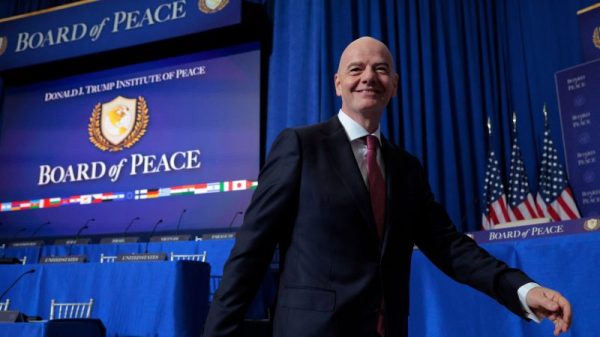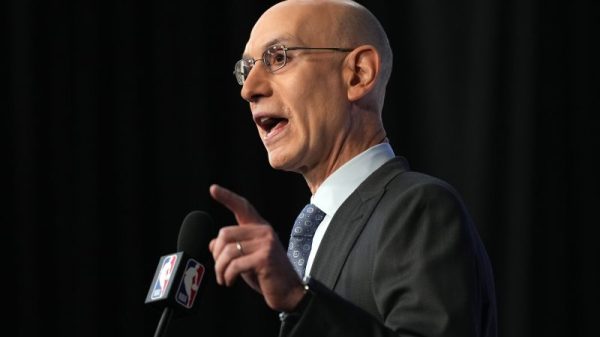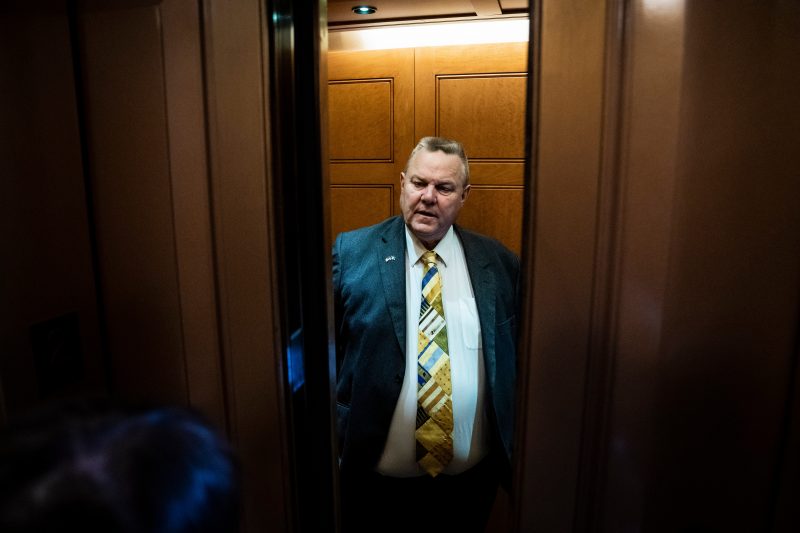A self proclaimed “seven-fingered dirt farmer” could stand between Republicans and the Senate majority in 2024.
Sen. Jon Tester of Montana, one of the most vulnerable Democrats up for reelection next year, has bedeviled Republicans since 2006, winning reelection twice in a deep red state whose other senator, Steve Daines, is now in charge of gaining back the majority for Republicans as chairman of the National Republican Senatorial Committee.
“He’s pretty wily,” said Sen. John Cornyn (R-Tex.), who once led the NRSC, of Tester. “He’s been able to hold on a long time.”
Republicans hope to change that this time, with Daines and his longtime top aide Jason Thielman, the NRSC’s executive director who is also from Montana, working to recruit a top-flight challenger to Tester and using their expertise to plot his defeat from their perches at the organization. They argue the state has changed rapidly since the last time Tester won, and their bet is that Montanans will no longer let their affection for the likable senator with a penchant for salty language override their increasing alienation from the Democratic Party.
“The biggest disadvantage that Jon Tester has is that there isn’t a senator in America whose voting record is more out of step with the preferences of his state,” Thielman said in an interview. “He is proud to be out of step with Montana and frankly arrogant about his ability to do so and think he can get away with it.”
This time, Tester doesn’t have the “grace” to pull off a win in the red state, Thielman added.
Tester’s campaign manager, Shelbi Dantic, said Republicans are “scared” of facing Tester and that he defends “our Montana way of life every day.”
But Tester’s allies essentially agree that the race will be a test of whether the senator’s authenticity and connection with his home state’s voters can override most Montanans’ inclination to vote Republican. Trump carried the state by 16 percentage points in 2020 — less than he won it by in 2016. But in 2022, Democratic state lawmakers lost races in the party’s former stronghold of Great Falls and Cascade County — Tester’s backyard — and the GOP gained a supermajority in the Montana state legislature.
The state’s population also has grown rapidly since 2020, and Thielman predicts many of the new residents, who he believes were fleeing more restrictive covid-19 policies, will vote Republican. And Daines was able to defeat popular Democratic Gov. Steve Bullock to win reelection in 2020, a warning sign that likability might not be enough to save a Democrat statewide anymore.
“It’s really a question about political brand versus personal brand. And that’ll be the story of this election,” said Democratic strategist Jim Messina, President Obama’s former campaign manager, who has advised Tester in the past.
Tester has used his charm and his deep roots in the state in the past to attract voters who typically reject Democrats.
“A lot of Montana still likes the guy,” said Montana state Sen. Jason Small, a Republican. “At the end of the day I think a lot of people in Montana look at it like this: You got one candidate that’s from Montana and odds are another one that isn’t and that is a deciding factor for a lot of people.”
That ups the pressure on Daines and Senate Minority Leader Mitch McConnell (R-Ky.) to recruit a winning opponent.
Rep. Matthew M. Rosendale (R-Mont.), who lost to Tester in 2018 after the senator’s campaign dubbed him “Maryland Matt,” has not ruled out running again, and he would probably enjoy the backing of the conservative and anti-tax PAC Club for Growth in a primary. Tester, who lost three fingers in a meat grinder accident, also raised questions about whether Rosendale was actually a rancher, as he claimed, after it emerged he did not own any cattle. (He said he leased his land.)
Daines and McConnell, meanwhile, have encouraged wealthy businessman and decorated veteran Tim Sheehy to run, and Daines sounded optimistic about the prospects Sheehy would get in at a recent presentation to GOP senators about the 2024 map.
Daines listed Tester and two other Democrats in states that voted for Trump in 2020 — Sen. Sherrod Brown in Ohio and Sen. Joe Manchin III in West Virginia — as the NRSC’s top targets at the presentation.
“He obviously has special insights into how Montanans think, how they behave, the political history of the state and the way it’s been trending,” said Sen. Kevin Cramer (R-N.D.) of Daines. “Clearly the emphasis and focus right now is on recruiting top-tier candidates in those three red states with blue senators.”
National Republicans have recruited candidates to take on Brown and Manchin, but Tester, for now, remains unopposed. Sheehy getting in would be a coup for Daines. As a newcomer to politics, the businessman lacks political baggage and has the ability to self-fund — a key perk given Democratic Senate candidates’ fundraising advantage over Republicans in recent cycles.
Daines’ personal interest in the race arguably makes Tester’s reelection even harder, and the new NRSC chair has shown he’s willing to try out controversial tactics to win. Last month, Montana Republican state lawmakers moved to restrict the ability of third parties to make the ballot in the 2024 Senate race — widely interpreted as a way to prevent a Libertarian candidate from siphoning off support from the Republican candidate. The initial bill, which was pushed by a lobbyist closely associated with Daines, was narrowly targeted to Tester’s race and would have sunset immediately afterward, drawing charges of partisan interference.
Some Republican lawmakers, facing an uproar from Libertarian constituents, helped kill the bill and said they resented the interference from Washington. Both Republicans and Democrats have benefited from having third-party candidates on the state’s ballot in the past, and it’s unclear a Libertarian would have boosted Tester anyway.
“The optics just are so bad,” said Small, who opposed the effort. “I don’t think everybody up here is nuts, and I couldn’t have been the only one that’s thinking that.”
Daines and Tester both had muted responses to the bill dying when asked by The Post.
“I respect our legislature and I think they had a good debate,” said Daines. “But I’ll always respect the outcomes of the people who serve in the state legislature.”
Tester didn’t celebrate the fact that the maneuver failed.
“I think that’s fine, but I really wish [the legislature] would have worked on things like child-care and inflation and the price of housing and all that stuff, but they dealt with politics and social issues all session,” he said.
But Messina, the Democratic strategist, said the move “really pissed people off.”
“It shows Daines’s desperation that he tried to rig the rules,” Messina said.
The move drew some blowback from other Republicans, including former governor Marc Racicot, who supported Daines when he ran for the House and Senate but has broken with his party over his opposition to Trump.
“So here they come in with this plan invented in some faraway land called Washington, D.C., with the intent of figuring out ‘How can we beat this guy?’ For what? So we can have a majority? For what?” Racicot said. “That’s a disappointment to me that this is all about only winning.”
“I understand it’s a competitive enterprise,” he added. “But victory at any cost to me is a misplaced set of priorities.”
Democrats bought ads to boost the Libertarian candidate in Tester’s 2012 race, a spokesman for the NRSC pointed out, and Daines has said he supported the effort because he believed the winner of the Senate race should gain a majority of the vote.
Even with the primary rules unchanged, Tester faces a formidable path to reelection, although he’s a prolific fundraiser and skilled on the stump. He raked in $5 million in his first quarter of fundraising, his campaign announced, most of it after he officially jumped into the race in late February. Rosendale, who has not announced he’s running, raised less than $100,000 over the same period.
In 2018, Trump appeared multiple times in the state to campaign against Tester, but the senator pulled off a reelection victory anyway. He touted his independence from the Democratic Party by pointing out in an ad that he helped pass more than a dozen bills that Trump signed into law. But he also led the charge against Trump Veterans Affairs appointee Dr. Ronny Jackson, who was forced to withdraw after the senator raised questions about allegations he created a hostile work environment and liberally handed out prescription drugs.
This time, it could be harder for Tester to make the same case of independence, given Democratic President Biden is in the White House. He’s made some moves to distance himself from the White House in recent weeks, including staying coy about whether he will vote for Biden’s Labor Secretary nominee, Julie Su, whose record as the head of California’s labor agency has drawn Republicans’ opposition. But his voting record remains in line with Democrats.
“What makes it difficult is people have now put on their jerseys and reject the Democratic agenda and Tester has never hidden … that he votes in lockstep with Biden,” Thielman said.
Sen. Gary Peters (D-Mich.) the chair of the Democratic Senatorial Campaign Committee, said Republicans will probably end up tangled up in their own primary fight, which could boost Tester, who can focus on the general election.
“Jon always runs very strong in Montana and he’s only gotten stronger as he’s gotten to know more people through the state,” Peters said.



























